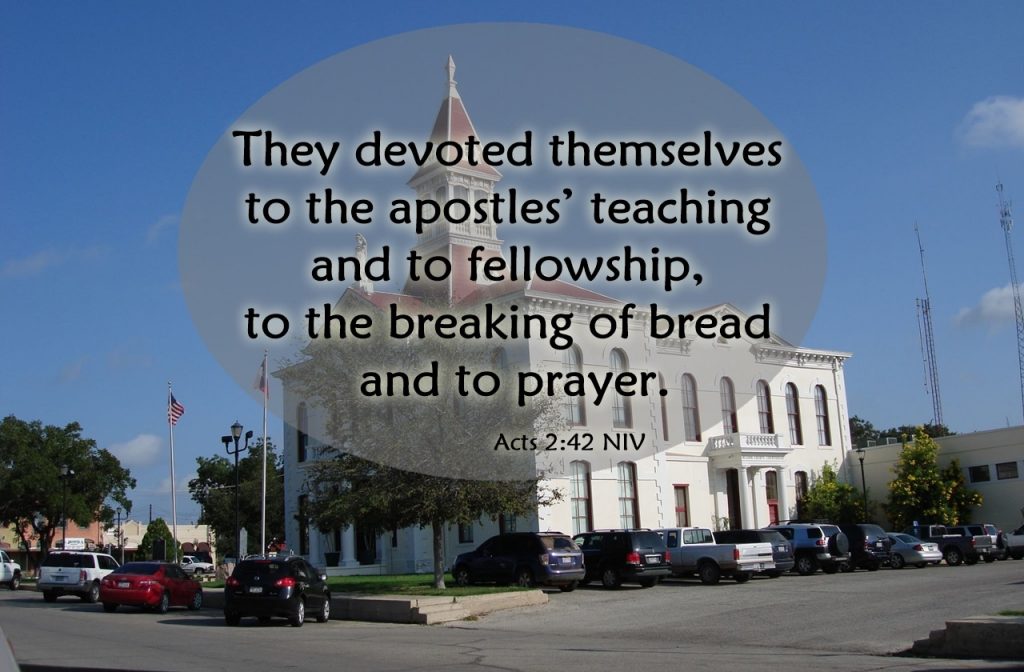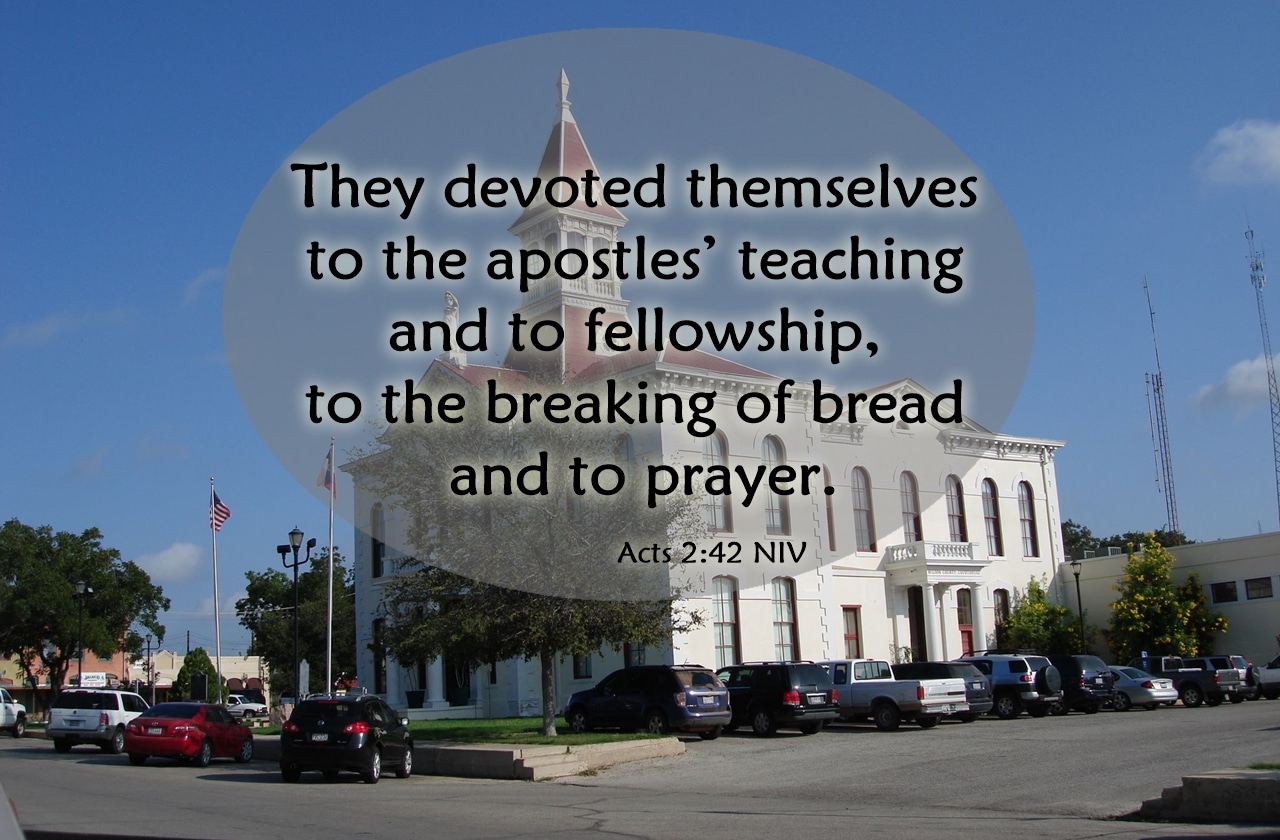
There is a passage in the book of Acts that I have been drawn to recently. This passage describes the life of the church in the earliest days after Pentecost. And I am wondering if maybe what worked for them might not also work in the church today? Are we daring enough to break from our traditions and follow the example of the early church?
They devoted themselves to the apostles’ teaching and to fellowship, to the breaking of bread and to prayer. Everyone was filled with awe at the many wonders and signs performed by the apostles. All the believers were together and had everything in common. They sold property and possessions to give to anyone who had need. Every day they continued to meet together in the temple courts. They broke bread in their homes and ate together with glad and sincere hearts, praising God and enjoying the favor of all the people. And the Lord added to their number daily those who were being saved.
Acts 2:42-47 NIV
There no doubt is more in this passage than I am capable of pulling out. But it seems clear that there were a few simple things that this early church was doing.
Devoted To the Apostles’ Teaching
Verse 42 says that the members of the early church devoted themselves to four things. And the first of these was the apostles’ teaching. For the early church, I do not believe this meant that they had constant Bible studies. Rather they spent as much time as they could listening to what the apostles had to tell them. They were hungry to hear what God had to say through them and were committed to applying those teachings to their own lives.
I do not believe we have any apostles living among us today. But we do still have their teachings, as well as those of Jesus, in the words of the New Testament. Are we devoted to it, both in our private lives and our time together? Are we actively seeking to apply its teachings to our lives? Or is it just something we browse through occasionally, not really finding much application or need for change in its words?
Devoted To the Fellowship
For many Baptists, and I assume other denominations as well, the word fellowship is almost synonymous with a potluck. But I do not believe that is the case in this passage, especially since the next phrase deals with food.
I believe instead that the fellowship here is the body of believers. They were devoted to each other. But not just as individuals, like I am to my wife. But rather to the body itself. I believe that what Jesus prayed in John 17:20-23, that we as believers might be one, just as he and the Father were one, is what this early church was devoted to; becoming one.
That means they were sharing their lives together. Not just at the surface, but down in the depths where we are often afraid to go ourselves, much less let anyone else see. It also means they were looking out for the interests of the body, over their own. And it means they were spending time together, and not just an hour or two a week. They were leaving their TVs off and hanging out together and really talking. Not just about the weather. But about themselves and about God’s working.
Devoted To the Breaking of Bread
There are some who see this as referring to communion, or the Lord’s Supper. But it seems more likely that it is as simple as sharing meals together. This could be communal meals, like a potluck. But later in this passage, it says that they broke bread in their homes and ate together. So it seems more likely that they were spending time together in their homes and sharing meals together there. And I do not think it is much of a reach to extend this from simple meals to other types of activities. The members of the early church were doing stuff together; meals, shopping, playing, yard work.
It would seem like this sharing of our ‘outward’ selves would enhance the ability to share our ‘inward’ lives together. As we break bread together, we are more inclined to enhance the fellowship by sharing our inward lives with each other.
Devoted To Prayer
In this verse, it seems to me that the second and third elements are related to relationships between members, while the first and fourth are dealing with their relationship with God. They were devoted to prayer. And not just to open and close their worship services and for meal blessings. They gave themselves over to communicating with the Father. I have no doubt their prayer included praise and adoration of the Father, as well as intercession for needs. But it is also clear that their prayer included requests for boldness (Acts 4:23-31). And it probably included requests for a better understanding of God’s purpose and how he equips them for more effective service (Eph. 1:15-23).
Meeting In Large and Small Groups
Verse 46 says that they met daily in the temple and that they also met together in their homes to share meals, and likely the rest of their lives. Coming together as a body to worship and serve is important. We are called to be one body, and corporate worship and other full-body activities are necessary if we are to be one body, bound tightly together and effectively serving (Eph. 4:15-16).
But small group activities are also important. I am very limited in my ability to get to deeply know a large number of people, especially when in large-scale settings. But in the intimacy of a home with a few other people, it is much easier to let down the curtains and allow others to know me. And for me to come to more intimately know them.
I am convinced that real growth within the body requires both of these elements. A time together to develop an identity as the body of Christ. And a time with smaller groups to develop relationships within the body. I do not believe there is any magic formula for success in either large or small group settings. But I do believe verse 42 gives a pretty good outline: time in the word, sharing our inner person, sharing the outer person, and spending real time in real prayer.
Daily Additions
And the result was twofold. First, they were enjoying the favor of all the people. While not all of the community joined them, they did respect them and recognized that something was going on there. And secondly, and more importantly, the Lord added to their number daily those who were being saved. The church was not only growing in spirit; they were also growing numerically as more and more people were being saved. It is interesting that nowhere in this passage is it mentioned that they were evangelizing, although undoubtedly they were. It appears instead that the impetus for growth was in how appealing their life was to those watching them. People saw what they had and wanted it as well.
I wonder what would happen in my community if F.B.C. Jerusalem from 30 A.D. was swapped out with the church I serve in. Would what they were doing then work today? Would they continue to grow dramatically, enjoying the favor of the surrounding neighborhood? I have to believe they would. Would it work for us, should we devote ourselves to the apostles’ teaching and to the fellowship, to the breaking of bread and to prayer? Are we willing to try?
Disclaimer
The views expressed here are solely mine and do not necessarily reflect those of any other person, group, or organization. While I believe they reflect the teachings of the Bible, I am a fallible human and subject to misunderstanding. Please feel free to leave any comments or questions about this post in the comments section below. I am always interested in your feedback.
